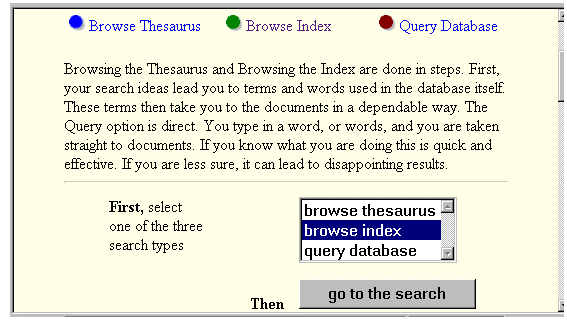Education-Line
Education-line aims to help education professionals to present their work for immediate review and find elusive whole documents on-line. The pilot service was launched in January, and observers have already started to comment on indications of success. Our ambition is to have a fully-functioning, high-value service up and running by the end of February 1998. Some distinct and valuable achievements can already be reported.
Document acquisition has been steady. At May 30th, the collection stood just short of 200 documents, with negotiations well in hand to acquire larger numbers of additional documents through the Summer and Autumn conference seasons. Wherever possible, each document acquired has been encouraged as a first contribution in a series. Several authors have returned with a second, or even a third submission. Authors’ purposes in submitting to Education-line have included frustration with long delays in print journal appearance, the need to have policy relevant material visible while its subject matter is current, the desire to have work stored and indexed for the future, the determination to be involved in new media as early as possible and the commitment to open and collaborative models of scholarly discourse. In many cases, our approaches to authors have been through the intermediary of one of Education-line’s partner organisations. These organisations have been crucial to the progress we have made in acquiring such a number and variety of high quality documents.
In the first five months our database logs have shown active, often extensive enquiries from 1200 separate IP addresses. One in eight of these have already made return visits. 50 new users are arriving each week. On average, the bibliographic details of each document in the collection have been “found” through one of the search procedures five times. The less reliable web server logs indicate that anything between 20 and 60 whole documents are downloaded each working day.
Education-line’s adoption of a controlled vocabulary (the British Education Index Thesaurus) and a robust, well supported database (BRS) has allowed us to develop a precise, multi layered search interface for the web browser. Terry Screeton of the University of Leeds Computing Service has written generalisable code that supports the current range of search possibilities, and lays foundations for subtleties and extensions as the service grows.
We have been sensitive to users’ approaches to the database, gathering detailed information about the search strategies they adopt as well as talking to scores of users directly. We believe that the resulting facilities reconcile the extremes of what we have found by offering a range of options. At one pole is that familiar advocacy of immediate and perfect results without the trouble of learning strategies to achieve them. Here we offer a “latest 20” option, and direct access to special groups of documents. The opposite extreme is a more technicist approach, demanding certainty, flexibility and transparency, willing to spend some time learning and refining strategies appropriate to purpose. Browsing the thesaurus and index, or using Boolean searches to query specified fields satisfy aspects of this demand. Structuring the search interface carefully, and offering context specific help makes it possible for users to become more focused and more expert in relatively painless stages.
With 104 extra documents arriving as I write this, with four conferences to service before October, Education-line is acquiring that critical mass that will make it a natural and essential part of the education and training world.
References
[1] Education-line Web Site,
http://www.leeds.ac.uk/educol/
Author details
Sam Saunders,Education-line project officer
Email: edu6jps@lucs-03.novell.leeds.ac.uk
Phone: 0113 233 5525
Fax: 0113 233 5524

